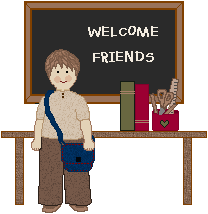Following my theme of home schooling with only one student, today I will focus on "socialization".
For many home schoolers, however in my home school a day arrived when we began to see a need for changes in this area. Through no fault of the student, there had been a season of less-focused parenting. One day, when he was six, I received a call that my dad had died.
That same year my step-dad had been in and out of hospital, nursing home, hospital, and ultimately hospice. Six months after my dad died, my step-dad died.
I was struggling to home school, with a senior in a private school (using my car), and I was now responsible for my dad's estate, selling house, condo, collections, stocks, properties out of state -- I was over my head. I assumed my mom would handle my step-dad's estate. She did not. And six months later we learned she was terminal with lung cancer, and seven months after my step-dad, my mom died.
I'm not making excuses, but I wasn't doing well, and I needed some sort of help, some group activities for my son. I had done 4-H with my older (now adult) children, so I started my son in 4-H Clovers, and then 4-H as he got older.
In spite of the fact that I knew how to "do" 4-H, it was never a good fit for my son. For years we continued with 4-H, but we made efforts to branch out in other ways as well. We tried going roller skating with other home schoolers every Friday afternoon. That, it turns out, is still a rather solitary activity. We joined a home school field trip group, where we went on a group field trip twice a month, but it was also not a good fit.
We tried home school co-op classes. Not a good fit. Look at that face!
We finally found a groove in Cub Scouts/Boy Scouts.
We finally had some constructive activity to help us shape his character, direct his activity and energy level, and something he enjoyed doing.
But as the years passed, he came to enjoy it less. To a degree it still came down to some difficulty dealing with others (boys). There was even some bullying going on (our son was short for his age, and for a time he was stout), and there was difficulty with adults and scouts thinking he was younger than he was.
He was also not happy with the disrespect the boys showed to other scouts and to the adult leaders. When the Senior Patrol Leader said, "Line up!" my son wanted the other scouts to line up at attention and quietly listen for instructions. They didn't.
Seeing this aspect of my son's personality (what he wanted seemed to be military discipline), and knowing Boy Scouts was not supposed to be a military organization, I started brain storming again. When I was a kid my brother was in Civil Air Patrol, and I'd seen blogs of others whose kids were in Civil Air Patrol, so I told my son about it and we checked it out. My son loved it and joined.
By this time, though, he had a lot invested in Boy Scouts and wanted to finish to Eagle. It was a tough go of it, with ups and downs in his motivation, but he finally did finish to the rank of Eagle.
The Boy Scouts program ends at age 18, unless you go into leadership from there. My son turned 18 during his senior year and was so busy he did not go into a leadership position from there. He has been working on his education, and is also working to achieve a similar honor awarded to Civil Air Patrol cadets, the Billy Mitchell Award. He can do this because Civil Air Patrol permits cadets to continue until age 21.
In addition, he is considering a career in the military. In college he will be participating in Air Force ROTC (Reserve Officer Training Corps).
My point in walking you through my experience is to encourage you to consider socialization, particularly if you are home schooling a lonely only. Maybe you don't need to, but we sure did. If you brainstorm and research you will find there are many activities available for you to consider. If you don't know where to start, you can try to find other home schoolers by posting a 3"X5" card on a bulletin board at your local grocery store! My area has home school groups for chess club, 4-H, Boy Scouts, field trips, co-ops, classes, and on and on. Find out what is available to you!






















































